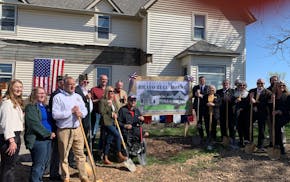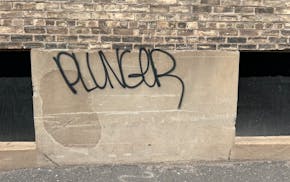Dogs' No. 2 is becoming Minnetonka's No. 1 priority this weekend.
Like most cities, the western suburb requires pet owners to pick up pet waste outside their own property. But when residents collected 200 pounds of poop at city parks in less than two weeks, the city decided to take its duty against dog poop more seriously.
This spring, the city is launching a new pet-waste pickup campaign, starting with the messy job Saturday of researching just how big the poop problem is in its parks.
"Is it a perceived or real problem in Minnetonka? If they collect 200 pounds of poop, then I'd say we have a problem," said Jo Colleran, the city's natural resources manager. "Pet waste is an environmental issue because of bacteria and nutrients washing into water. And it's just gross … it's this community norm."
Newsletters, an electronic billboard on busy Interstate 394, flashing a reminder to pick up dog poop, and even educating elementary school students about the problem didn't seem to be enough.
So now, the city is following other educational campaigns in cities like nearby Waconia, which used to encourage dog owners with its "Poo-llution Prevention Program," offering free dog bandannas in exchange for taking a clean-water pledge.
In the Puget Sound region in Washington, a water pollution campaign included the catchy public service announcement spoofing the 1990s R&B song, "No Diggity," pleading, "Dog doogity, we've got to bag it up."
In Maine, Portland has an annual "April Stools Day" for picking up dog waste. And in Boston, a suburb even proposed DNA testing of dog feces to track down offenders.
Most cities are more traditional, with ordinances requiring pet owners to pick up pet waste on public land. But in Minnetonka, that law hasn't been enough.
Larry Wade, a resident and naturalist, was skiing frozen Minnehaha Creek last winter when he found that some dog owners just weren't doing their doo-doo duty.
"There was way too much out there," he said. "I sort of lost it."
The retired Hopkins teacher blogged about it and, with friends, collected an estimated 200 pounds of poop in less than two weeks from some of Minnetonka's 50 parks. He took the information to the city's park board members, who were astonished by it, causing them to add a pet-waste pickup campaign to its 2015 goals.
"Minnetonka has some great parks, and the land can't sustain that amount of waste," Wade said. "It really ruins the experience. If you've ever stepped in dog poop, it affects your day. It's every dog owner's responsibility in a suburban area."
'Be good neighbors'
On Saturday, volunteers will do just that, collecting dog poop at Purgatory Park, a popular 155-acre park where dogs roam in undeveloped areas of prairie land and oak forests next to Purgatory Creek. The waste will then be weighed to literally see how big the problem is in the park.
Later this year, Colleran said the city may put up new signs about the law at parks and team up with local businesses like veterinarians and dog day cares to help get out the message.
She added that the poop problem becomes more of an issue in winter and early spring when more dog walkers seem to neglect poop scoop duty, thinking it will decompose.
Instead, it can pile up in parks and wash into nearby creeks and lakes, posing a bigger water quality problem than wild animal feces due to the higher concentration of pets in one area.
"It's an important issue as it relates to water quality," she said. "We're just trying to encourage people to be good neighbors."
Kelly Smith • 612-673-4141

New sober house for veterans in southern Minnesotan wants to treat the real issue: PTSD
Two North Loop condos combined into one 'dreamy' space listed for $649,900

Minneapolis murder suspect arrested after decadelong escape
What to know about a possible Minnesota equal rights amendment on abortion rights
